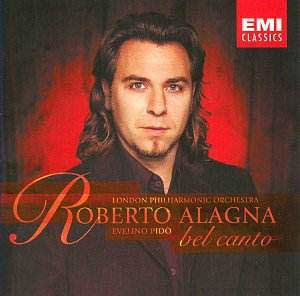I started by listening to 'Prendi I'anel ti dono’
from Bellini's La sonnambula (tr 3). Recently, Decca's new star
Juan Diego Florez sang the tenor part at London's Covent Garden and
Milan's La Scala. The part of Elvino is very much ‘tenore di grazia'
(light lyric tenor) territory and compared with Tagliavini (Fonit Cetra)
or Pavarotti (Decca), Alagna makes heavy weather of it. Whilst singing
softly in parts, his movement between registers is laboured, the voice
lacking essential ease of support. Moving on to the slightly heavier
'Una furtiva lagrima' (tr 15), I found Alagna lacking lightness
of vocal touch and his inability to caress a phrase, as Pavarotti does
(Decca), frustrating. He lightens his tone, but that does, however,
reveal something of his rather nasal vocal emission. The heavier role
of Pollione from Norma (tr 8-9), with its more heroic demands is more
to Alagna's liking although I would have preferred more expression and
variation of vocal colour.
Moving to Donizetti's 'Paris' operas, La Favorite
(tr 4-6) and La Fille du Régiment (tr 17-20), and with
the extracts sung in French, I had higher hopes. These were better realised,
although the top notes at the conclusion of Fernand’s Act I Cavatina
(tr 4) sounded more falsetto than head voice. As Tonio (La Fille)
we get the Act 2 'Romance' (tr 17), nicely realised, then the brief
Act I Cavatina and part of the extended duet with the corporal and soldiers,
including all the famous high notes taken from the chest with pleasing
lyric tone (tr 20). In the Bellini roles of Arturo (I Puritani
tr 13), and Gualtiero (Il pirata tr 16) Alagna is least successful,
seemingly having to squeeze out the high tessitura in a rather throaty
way. It is though a pleasure to hear his wife in the latter excerpt,
and also in the earlier one from La sonnambula. She brings artistry,
as well as a delicacy of intonation and phrasing to her singing which
seems beyond her husband, particularly when singing in Italian.
The recording is bright, clear and well balanced with
Evelino Pido an ideal conductor of this repertoire. An interesting and
varied album, even if the realisation doesn't quite match the ideal.
The booklet contains a brief outline of the context of each excerpt
and translations in English, German and French.
I wonder if the fact that the recording sessions were
in the autumn of 1999, and the disc is only just released, indicates
that others had reservations too? I will await with interest Florez's
forthcoming album, from Decca, of bel-canto arias, and see what overlap
there is and how the singing compares.
Robert J Farr


![]() See
what else is on offer
See
what else is on offer 